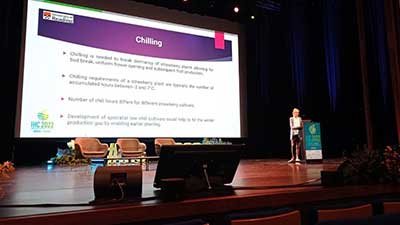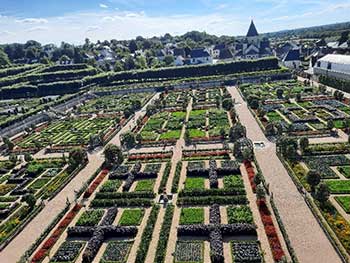The David Miller Travel Bursary Award aims to give early career plant scientists or horticulturists the opportunity of overseas travel in connection with their horticultural careers. Sophie Read was awarded one of the 2022 David Miller Travel Bursaries to attend the 31st International Horticultural Congress in France and reports her experience here.
"I am a PhD student (in my 4th year of study) at the University of Reading, undertaking a Collaborative Training Partnership PhD in collaboration with NIAB EMR, looking at sustainable year-round production of strawberries in the UK. This is an area of particular importance in today’s society with increased awareness regarding challenges including global climate change and food security. During my PhD I have carried out a series of glasshouse experiments looking at the effect of different cultural and environmental factors such as planting date, temperature and photoperiod, on strawberry plant growth, development and yield. The overall aim is to evaluate methods to produce high quality strawberry yields over the British winter season to compete sustainably with imported strawberries.
"I am very grateful to the SCI Horticulture Group for choosing me as a David Miller Award recipient for 2022 which I used to help fund my recent attendance at the 31st International Horticultural Congress held in Angers, France. This was the first international conference that I have attended in person and it was a really valuable experience that gave me a deep insight into the broad scope of the horticultural industry. Over the duration of the congress, from 14th-20th August, there were 12,000 hours of presentations given by 150 speakers across 25 symposia. The congress was staged as a hybrid event and involved 2,500 participants from 88 countries worldwide.

"In addition to the symposia, there were daily plenary sessions given by keynote speakers addressing 4 key challenges facing the horticultural industry including skills, food quality, public health and well-being, sustainability and climate change. There were also a series of evening workshops which were intended for more interactive discussion based around addressing these core challenges. Of particular interest to me, was a workshop entitled ‘What pedagogical innovations in horticulture and landscape methods?’ This workshop consisted of a series of speakers giving presentations about their methods of teaching horticulture at university level and introduced some specific resources that they have developed to do this. This links to my interest in education and desire to contribute to increasing engagement in the British horticultural sector through outreach activities. I thought that some of the strategies and resources being discussed could have real benefit in the UK educational system. My passion for embarking along this avenue developed following the completion of my 3-month placement with the SCI Horticulture Group where I worked on a project analysing horticultural provision in UK tertiary education. This increased my awareness of the deteriorating levels of horticultural skills and teaching in the UK and my desire to contribute to reversing this trend.
"Following on from the congress, I also participated in a technical tour involving visits to two horticultural educational institutions in Angers (Lycée Le Fresne and L’institut agro Rennes Angers). We saw the facilities available to support students in their courses and the emphasis that was put on practical hands-on experience which is something not seen as commonly in the UK.

"Overall, I found this conference to be one of the highlights of my PhD so far. I gained a lot from the experience including new knowledge and ideas for future experiments that I can carry out throughout the rest of my PhD and other skills including giving presentations, communicational skills and a general increase in self-confidence in engaging in networking activities. "
Sophie Read
PhD Student
University of Reading
